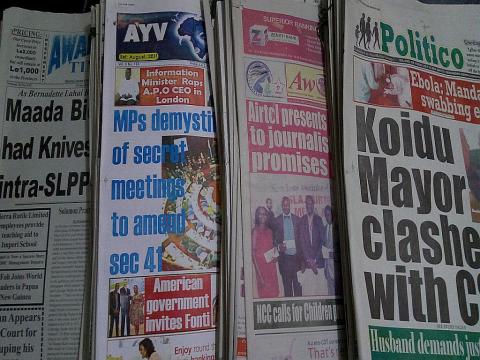By Kemo Cham
Commissioner Mustapha Sesay of the Independent Media Commission (IMC) last week, surprisingly, did the unusual when he caved in under pressure and abandoned his daily review of newspaper headlines.
“The Editors' Editor”, as he fondly calls himself, came under attack from fellow media practitioners for what I consider as an innovative idea. Through his ‘Headline Review’, he highlighted, critiqued and, at the same time, proposed corrections to headlines of the country’s newspapers he saw as passive, weak or wordy. He also pointed out inaccuracies and grammatical errors. Some of these are simple lapses that could be avoided, if only minimal consultation is done in the editorial rooms.
I first came across Mustapha in the run-up to the 2013 elections of the Sierra Leone Association of Journalists (SLAJ). He was contesting for the presidency. It was his day of presenting his manifesto to the voters at the SLAJ Conference Hall at Campbell Street. There were concerns among some of the journalists that Candidate Sesay wasn't practicing at the time and that as a staff of the Human Rights Commission of Sierra Leone, he couldn't make a good choice of president of the umbrella journalist body.
Sesay made it categorically clear at that manifesto reading session that he wouldn't resign from his job. I thought something was wrong with him by him going against the people who were supposed to vote him into office.
But with time, I would learn that I had a lot in common with Sesay, in terms of firmness in what we believe in and consistency in standing for it. He has demonstrated that in his seemingly never ending quest to head SLAJ.
So, when I read on his Facebook page that he was suspending Headline Review, I felt somewhat disappointed.
That colleague journalists did not like it didn't surprise me, nor did the level of sustained opposition to it; the reason forwarded by those who openly spoke against the idea is what surprised me. While it is a good idea, they argued, it must be done in private, out of view of the public.
“Journalism is a respectable profession and its practitioners must not be ridiculed in the public,” one critic wrote under one of Sesay’s earliest reviews, which generated some of the fieriest exchanges between him and those opposed to the idea.
This person went on to note that lawyers, doctors, accountants, lecturers etc., do make mistakes in the course of their work but that “they find a way of handling their matters internally [rather] than bringing it to the public.”
The general argument actually revolves around this: that while it is good, outsiders – non-journalists – mustn’t see the reviews which expose our limitations. This is quite an absurd argument in my view.
No one knows how to critique people like journalists. It is what we do daily to politicians, lawyers, doctors, accountants, lecturers and the rest of society. Why then is it not ok when it’s done to us, especially so by one of us?
Sesay, in his Suspension of Headline Review notice, dated July 17, noted that he wanted to “consult and give adequate thoughts to the series of public and private concerns over the review methodology, and proposals on how to best improve/add value to the exercise, thereby generating popular, rather than divided appreciations.”
Firstly, I thought it was a big loss for the general media fraternity. I learnt from it. And I’d like to believe that other editors and journalists did too.
As a matter of fact, Politico has been reviewed by him several times. I took absolutely no offense from those reviews. And even if I didn’t entirely agree with that particular review, I learnt from it a thing or two, mistakes I know I can never repeat.
Very few of us can admit this, but the exercise was very much needed in this country, where journalism is in a very big crisis. And one of the reasons for this crisis is our refusal to accept the fact that our profession is in a crisis. I don’t even want to start on that here.
The front page review is just one way of addressing the myriad of issues we have been dealing with in silence for a very long time.
No one is saying here that Headline Review must be taken as biblical assertions. Like all other reviews, they were just the opinions of the reviewer, alternative views to the editors’, informed by the reviewer’s professional experience.
They say there is more than one way to kill a cat. This saying also goes true for writing generally and newspaper headlining in particular. There is always at least two ways one can write a headline or caption.
The bottom line: as editors, we stood to gain and not to lose from the exercise.
The point that doing the review in public exposes journalists to ridicule is, in a way, an admittance of our limitations. And that leaves me wondering why, if one has limitations, they have to be bothered about how other people think about them, rather than fixing those limitations.
Copyright (c) 2020 Politico Online








